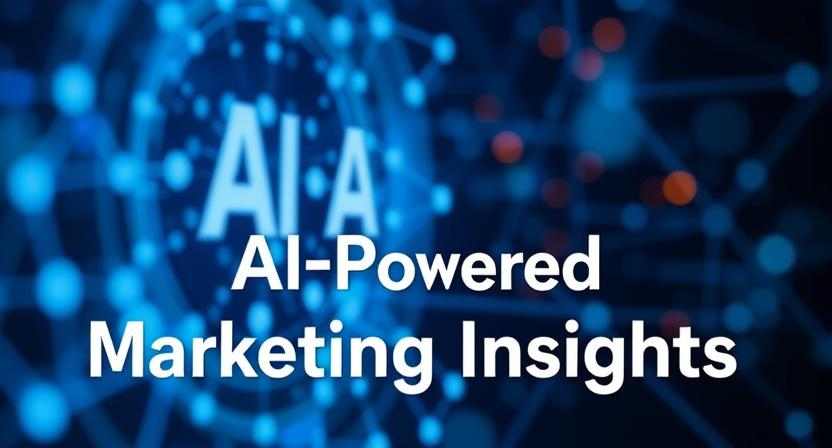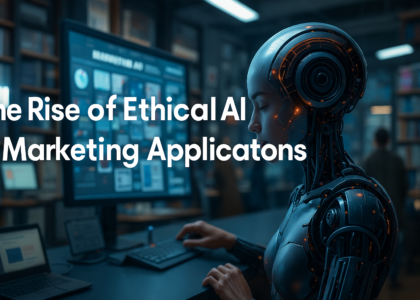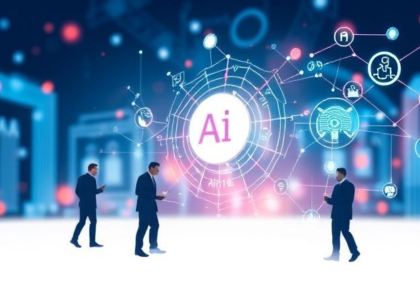Artificial intelligence (AI) is revolutionizing the marketing landscape, providing businesses with advanced data analytics that drive smarter decision-making. AI-powered marketing insights help brands understand customer behavior, predict trends, and optimize marketing strategies. In this article, we explore how AI can enhance marketing analytics and provide actionable insights for businesses.
The Role of AI in Marketing Analytics
AI plays a crucial role in transforming raw marketing data into valuable insights. Traditional marketing analytics rely on historical data, while AI-driven solutions process real-time data, identify patterns, and generate predictive insights. Tools like Google Analytics, HubSpot, and Salesforce use AI to analyze customer interactions, campaign performance, and market trends, enabling businesses to make informed decisions.

Key Benefits of AI-Powered Marketing Analytics
AI-driven analytics offer numerous advantages, including:
- Enhanced Customer Segmentation: AI clusters customer data based on behavior, demographics, and interests.
- Personalization: AI-powered recommendations improve customer experiences.
- Predictive Analytics: AI forecasts trends, helping businesses stay ahead.
- Real-Time Insights: AI processes data instantly for quick decision-making.

Leveraging AI for Customer Insights
AI enables businesses to gain deep customer insights by analyzing behavioral patterns. Key AI applications include:
- Customer Behavior Analysis: AI detects purchase intent and customer preferences.
- Sentiment Analysis: AI scans social media, reviews, and feedback to assess brand perception.
- Customer Lifetime Value (CLV): AI predicts the potential revenue from each customer, helping brands focus on high-value customers.

AI in Social Media Marketing Analytics
Social media platforms generate vast amounts of data, and AI helps marketers extract valuable insights. AI-driven social media analytics tools provide:
- Engagement Tracking: AI measures likes, shares, and comments to evaluate content performance.
- Sentiment Analysis: AI interprets public opinion and brand perception.
- Influencer Marketing Analytics: AI assesses influencer performance and audience engagement.

AI-Powered SEO & Content Marketing Analytics
AI is transforming SEO and content marketing by automating tasks such as:
- Keyword Research: AI identifies high-performing keywords and search trends.
- Content Performance Tracking: AI analyzes reader engagement and bounce rates.
- AI-Generated Content: AI tools like GPT-powered models generate blog posts and marketing copy efficiently.

Using AI for Ad Campaign Optimization
AI-driven advertising solutions optimize ad spend and campaign effectiveness. Key AI applications in advertising include:
- Programmatic Advertising: AI automates ad placements based on user behavior.
- Predictive Analytics: AI forecasts which ads will perform best based on historical data.
- Budget Optimization: AI allocates ad budgets dynamically to maximize ROI.

AI in Email Marketing & Automation
AI enhances email marketing by improving targeting, personalization, and automation. Features include:
- A/B Testing: AI analyzes different email versions to determine the best-performing one.
- Predictive Email Targeting: AI anticipates customer responses based on behavior.
- Personalized Email Campaigns: AI customizes email content for each recipient.

AI-Powered Chatbots and Customer Engagement
Chatbots powered by AI play a vital role in customer interactions and marketing analytics. Benefits include:
- Data Collection: Chatbots gather insights on customer preferences and behavior.
- Customer Support: AI chatbots provide real-time assistance, enhancing user experience.
- Chatbot Analytics: AI evaluates chatbot conversations to improve engagement strategies.

AI in E-commerce & Retail Marketing Analytics
Retailers and e-commerce businesses use AI to enhance customer experience and optimize sales. AI applications include:
- Personalized Product Recommendations: AI suggests products based on customer behavior.
- Demand Forecasting: AI predicts inventory needs based on market trends.
- Customer Journey Tracking: AI maps out the entire customer journey to optimize touchpoints.

Ethical Considerations in AI Marketing Analytics
While AI-driven marketing is powerful, it raises ethical concerns:
- Transparency: Marketers should disclose AI usage in customer interactions.
- Data Privacy: Businesses must comply with regulations like GDPR and CCPA.
- Bias in AI Models: AI algorithms should be trained on diverse datasets to avoid bias.

Choosing the Right AI Tools for Marketing Analytics
Selecting the right AI marketing tools depends on business needs. Key features to consider:
- Data Integration: Ensure seamless integration with existing marketing platforms.
- Automation Capabilities: Look for AI tools that automate data processing and reporting.
- Customization: Choose AI tools that align with specific marketing objectives.
Popular AI marketing analytics platforms include Google Analytics, HubSpot, and IBM Watson.

Future Trends in AI Marketing Analytics
The future of AI in marketing analytics includes:
- Predictive Marketing: AI will anticipate customer needs before they arise.
- Hyper-Personalization: AI will deliver highly tailored marketing experiences.
- Voice Search Optimization: AI-driven marketing strategies will adapt to voice search trends.

Challenges and Limitations of AI in Marketing Analytics
Despite its benefits, AI adoption in marketing has challenges:
- Implementation Costs: AI solutions can be expensive for small businesses.
- Data Quality Issues: AI requires accurate and high-quality data for effectiveness.
- Balancing Automation with Creativity: AI should complement human creativity, not replace it.

Case Studies: How Brands Are Using AI-Powered Analytics
Many brands successfully leverage AI in their marketing strategies. Examples include:
- Netflix: Uses AI to recommend personalized content to users.
- Amazon: Leverages AI for dynamic pricing and personalized shopping experiences.
- Coca-Cola: Uses AI-powered sentiment analysis to improve marketing campaigns.
Conclusion
AI-powered marketing analytics offer businesses unparalleled insights, enabling data-driven decision-making. By leveraging AI, marketers can optimize campaigns, personalize customer experiences, and predict future trends. As AI continues to evolve, companies that integrate AI-driven analytics into their strategies will gain a competitive edge in the digital landscape.





